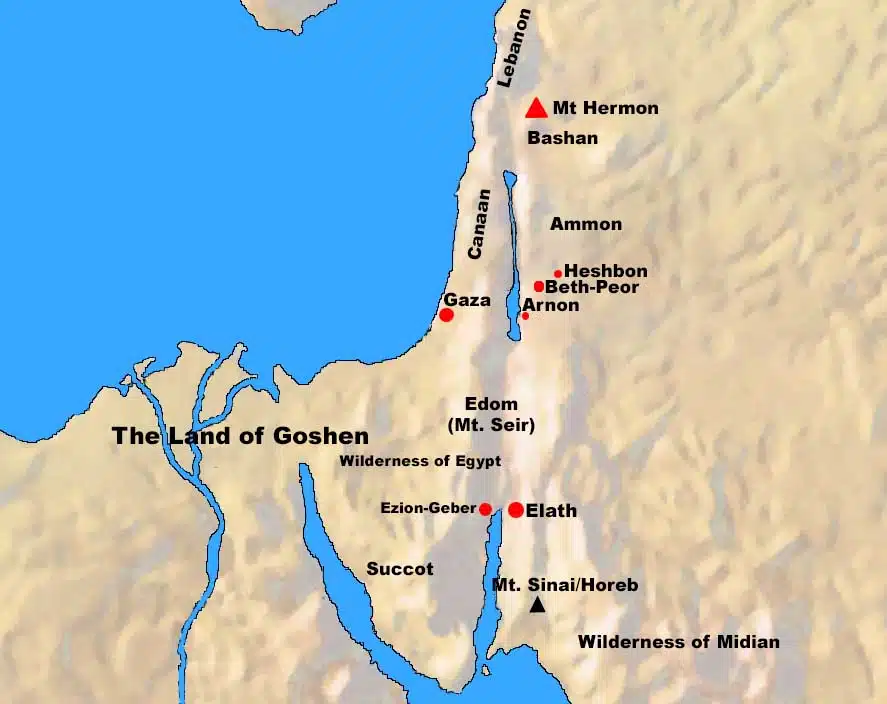Moses restates his response to the Reubenites, the Gadites, and the half-tribe of Manasseh after he had distributed the land east of Jordan to them. Moses said that he commanded them to help the remaining tribes in conquering the west side of Jordan. Then, he encouraged Joshua to cross over the Jordan with the people.
In this section, Moses repeated his response to the two and half tribes that had claimed their portions east of the Jordan river. According to Numbers 32, since these tribes had “exceedingly large number of livestock,” they thought the eastern side of Jordan would best meet their needs. So, they asked Moses for it. At first, Moses was hesitant to grant the request to them because he thought they did not want to cross the Jordan to conquer the Promised Land. However, when they vowed to help their fellow Israelites in conquering the west part of Jordan, Moses accepted their request (Numbers 32:1-25).
Thus, in Deuteronomy, Moses emphasized that the only condition to possess the east side of Jordan was that the two and half tribes took up arms and helped their fellow Israelites to conquer the west side of the Jordan river. He said, “Then I commanded you at that time, saying, ‘The LORD your God has given you this land to possess it; all you valiant men shall cross over armed before your brothers, the sons of Israel.” Although the LORD had granted them the land east of the Jordan River, the two and half tribes could not stay there until the conquest was over. They had to help their fellow Israelites to conquer the land beyond the Jordan.
To further settle the matter regarding the distribution of the land to these two and half tribes, Moses added, “But your wives and your little ones and your livestock (I know that you have much livestock) shall remain in your cities which I have given you, until the LORD gives rest to your fellow countrymen as to you, and they shall possess the land which the LORD your God will give them beyond the Jordan. Then you may return every man to his possession which I have given you.”
In helping their fellow Israelites, these valiant men were to leave their wives, little ones, and livestock in their allocated cities. After helping their fellow countrymen, these tribes could return to their assigned portions and “be free of obligation toward the LORD and toward Israel” (Numbers 32:22; Deuteronomy 3:20). The conquest took about seven years, according to Joshua 14:6-15. Thus, the two and half tribes spent at least seven years in war before returning home to their families in the region east of Jordan.
In verses 21-22, Moses turned his attention to Joshua, his successor. He restated the encouraging words he had shared with him to strengthen him as he was the one chosen by God to lead the people to Canaan. In doing so, Moses reminded Joshua of the defeat of King Sihon and King Og by the Lord of hosts. He said to him, “Your eyes have seen all that the LORD your God has done to these two kings; so, the LORD shall do to all the kingdoms into which you are about to cross.”
Such a reminder served to confirm what God was about to do to all the other kingdoms in which Joshua had been charged to cross with the people of God. The idea is that the Lord of hosts would do to the west as He did to the east. For this reason, Moses said to Joshua, “Do not fear them, for the LORD your God is the one fighting for you.”
The conquest of the kingdom of Sihon and the kingdom of Og already demonstrates the greatness of God. When He commanded His people to get ready for battle, He simply told them He had already delivered the enemy into their hands. All they had to do was to attack the adversaries and defeat them. At this point in the narrative, the Israelites have already conquered the east side of Jordan and were thus ready to cross over the west side (that is, the land of Canaan).
Biblical Text:
18 Then I commanded you at that time, saying, ‘The Lord your God has given you this land to possess it; all you valiant men shall cross over armed before your brothers, the sons of Israel. 19 But your wives and your little ones and your livestock (I know that you have much livestock) shall remain in your cities which I have given you, 20 until the Lord gives rest to your fellow countrymen as to you, and they also possess the land which the Lord your God will give them beyond the Jordan. Then you may return every man to his possession which I have given you.’ 21 I commanded Joshua at that time, saying, ‘Your eyes have seen all that the Lord your God has done to these two kings; so the Lord shall do to all the kingdoms into which you are about to cross. 22 Do not fear them, for the Lord your God is the one fighting for you.’
Check out our other commentaries:
-
Luke 16:1-9 meaning
Jesus tells His disciples the Parable of the Unrighteous Steward. It is about a manager of a rich man’s estate who is fired for bad...... -
Acts 4:31-37 meaning
God answers the believers’ prayer for boldness by filling them with the Holy Spirit. The church is united in heart and soul. The apostles continue...... -
3 John 1:3-4 meaning
John has heard report of how well the church was doing and it makes him glad....... -
Exodus 39:27-29 meaning
The priests' turbans, caps, breeches, and sashes are made....... -
Romans 1:18-21 meaning
Those who live unrighteous lives, whether believers or nonbelievers, will experience the wrath of God. The wrath of God here is God giving us over......




